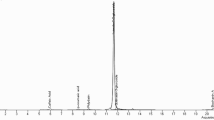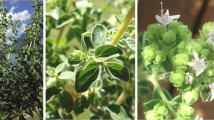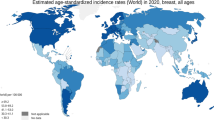Abstract
Adult T-cell leukaemia (ATL) is caused by human T-cell leukaemia virus type I (HTLV-I) infection and is resistant to conventional chemotherapy. We evaluated the inhibitory effects of agricultural plants on the proliferation of seven ATL-related human leukaemia cells, using three ATL cell lines (ED, Su9T01 and S1T), two human T-cell lines transformed by HTLV-I infection (HUT-102 and MT-2) and two HTLV-I-negative human T-cell acute lymphoblastic leukaemia cell lines (Jurkat and MOLT-4). A total of 52 samples of 80% ethanol extracts obtained from 30 types of agricultural plants were examined. On the basis of IC50 values, we selected samples with greater activity than genistein, which was used as a positive control. The highest inhibitory effect was observed with extracts from leaves of Vaccinium virgatum Aiton (blueberry) on four cell lines (ED, Su9T01, HUT-102 and Jurkat); seeds of Momordica charantia L. (bitter gourd) exhibited the second highest activity. The bitter gourd seeds suppressed the proliferation of three cell lines (Su9T01, HUT-102 and Jurkat). The extracts from edible parts of Ipomea batatas LAM. (sweet potato), edible parts of Colocasia esculenta (L.) Schott (taro), skin of taro and seeds of Prunus mume Sieb. et Zucc. (mume) showed markedly greater inhibitory effects on Su9T01 than genistein. These findings suggest that ATL-preventative bioactive compounds may exist in these agricultural plants, which are considered to be functional foods.
Similar content being viewed by others
References
Arisawa K, Soda M, Endo S, Kurokawa K, Katamine S, Shimokawa I, Koba T, Takahashi T, Saito H, Doi H, Shirahama S (2000) Evaluation of adult T-cell leukemia/lymphoma incidence and its impact on non-Hodgkin lymphoma incidence in southwestern Japan. Int J Cancer 85:319–324
Proietti FA, Carneiro-Proietti AB, Catalan-Soares BC, Murphy EL (2005) Global epidemiology of HTLV-I infection and associated diseases. Oncogene 24:6058–6068
Mueller N, Okayama A, Stuver S, Tachibana N (1996) Findings from the Miyazaki Cohort Study. J Acquir Immune Defic Syndr Hum Retrovirol 13(Suppl 1):S2–S7
Yamada Y, Tomonaga M, Fukuda H, Hanada S, Utsunomiya A, Tara M, Sano M, Ikeda S, Takatsuki K, Kozuru M, Araki K, Kawano F, Niimi M, Tobinai K, Hotta T, Shimoyama M (2001) A new G-CSF-supported combination chemotherapy, LSG15, for adult T-cell leukaemia-lymphoma: Japan Clinical Oncology Group Study 9303. Br J Haematol 113:375–382
Tomita M, Kawakami H, Uchihara JN, Okudaira T, Masuda M, Takasu N, Matsuda T, Ohta T, Tanaka Y, Mori N (2006) Curcumin suppresses constitutive activation of AP-1 by downregulation of JunD protein in HTLV-1-infected T-cell lines. Leuk Res 30:313–321
Zhang J, Nagasaki M, Tanaka Y, Morikawa S (2003) Capsaicin inhibits growth of adult T-cell leukemia cells. Leuk Res 27:275–283
Yamasaki M, Fujita S, Ishiyama E, Mukai A, Madhyastha H, Sakakibara Y, Suiko M, Hatakeyama K, Nemoto T, Morishita K, Kataoka H, Tsubouchi H, Nishiyama K (2007) Soy-derived isoflavones inhibit the growth of adult T-cell leukemia cells in vitro and in vivo. Cancer Sci 98:1740–1746
Li HC, Yashiki S, Sonoda J, Lou H, Ghosh SK, Byrnes JJ, Lema C, Fujiyoshi T, Karasuyama M, Sonoda S (2000) Green tea polyphenols induce apoptosis in vitro in peripheral blood T lymphocytes of adult T-cell leukemia patients. Jpn J Cancer Res 91:34–40
Moarbess G, El-Hajj H, Kfoury Y, El-Sabban ME, Lepelletier Y, Hermine O, Deleuze-Masquéfa C, Bonnet PA, Bazarbachi A (2008) EAPB0203, a member of the imidazoquinoxaline family, inhibits growth and induces caspase-dependent apoptosis in T-cell lymphomas and HTLV-I-associated adult T-cell leukemia/lymphoma. Blood 111:3770–3777
Ishikawa C, Tafuku S, Kadekaru T, Sawada S, Tomita M, Okudaira T, Nakazato T, Toda T, Uchihara JN, Taira N, Ohshiro K, Yasumoto T, Ohta T, Mori N (2008) Anti-adult T-cell leukemia effects of brown algae fucoxanthin and its deacetylated product, fucoxanthinol. Int J Cancer 123:2702–2712
Sasaki H, Nishikata I, Shiraga T, Akamatsu E, Fukami T, Hidaka T, Kubuki Y, Okayama A, Hamada K, Okabe H, Murakami Y, Tsubouchi H, Morishita K (2005) Overexpression of a cell adhesion molecule, TSLC1, as a possible molecular marker for acute-type adult T-cell leukemia. Blood 105:1204–1213
Wegrzyn G, Jakobkiewicz BJ, Gabig CM, Piotrowska E, Narajczyk M, Kloska A, Malinowska M, Dziedzic D, Golebiewska I, Moskot M, Wegrzyn A (2010) Genistein: a natural isoflavone with a potential for treatment of genetic diseases. Biochem Soc Trans 38:695–701
Matsuo Y, Fujita Y, Ohnishi S, Tanaka T, Hirabaru H, Kai T, Sakaida H, Nishizono S, Kouno I (2010) Chemical constituents of the leaves of rabbiteye blueberry (Vaccinium ashei) and characterisation of polymeric proanthocyanidins containing phenylpropanoid units and A-type linkages. Food Chem 121:1073–1079
Kobari M, Ohnishi-Kameyama M, Akimoto Y, Yukizaki C, Yoshida M (2008) α-Eleostearic acid and its dihydroxy derivative are major apoptosis-inducing components of bitter gourd. J Agric Food Chem 56:10515–10520
Acknowledgments
This work was supported by a Grant-in-Aid from the Collaboration of Regional Entities for the Advancement of Technological Excellence (CREATE) from the Japanese Science and Technology Agency. We thank Prof. Michiyuki Maeda (Kyoto University) and Prof. Naomichi Arima (Kagoshima University) for supplying the cell lines. We thank Prof. Hisato Kunitake (Miyazaki University) for identifying the scientific names of all agricultural plants.
Author information
Authors and Affiliations
Corresponding author
Rights and permissions
About this article
Cite this article
Kai, H., Akamatsu, E., Torii, E. et al. Inhibition of proliferation by agricultural plant extracts in seven human adult T-cell leukaemia (ATL)-related cell lines. J Nat Med 65, 651–655 (2011). https://doi.org/10.1007/s11418-011-0510-5
Received:
Accepted:
Published:
Issue Date:
DOI: https://doi.org/10.1007/s11418-011-0510-5




